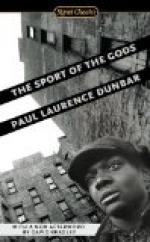He insinuated that he was looking around for business prospects. This proved his open-sesame. Five years had not changed the Continental frequenters much, and Skaggs’s intention immediately brought Beachfield Davis down upon him with the remark, “If a man wants to go into business, business for a gentleman, suh, Gad, there ’s no finer or better paying business in the world than breeding blooded dogs—that is, if you get a man of experience to go in with you.”
“Dogs, dogs,” drivelled old Horace Talbot, “Beachfield ’s always talking about dogs. I remember the night we were all discussing that Hamilton nigger’s arrest, Beachfield said it was a sign of total depravity because his man hunted ’possums with his hound.” The old man laughed inanely. The hotel whiskey was getting on his nerves.
The reporter opened his eyes and his ears. He had stumbled upon something, at any rate.
“What was it about some nigger’s arrest, sir?” he asked respectfully.
“Oh, it was n’t anything much. Only an old and trusted servant robbed his master, and my theory——”
“But you will remember, Mr. Talbot,” broke in Davis, “that I proved your theory to be wrong and cited a conclusive instance.”
“Yes, a ’possum-hunting dog.”
“I am really anxious to hear about the robbery, though. It seems such an unusual thing for a negro to steal a great amount.”
“Just so, and that was part of my theory. Now——”
“It ’s an old story and a long one, Mr. Skaggs, and one of merely local repute,” interjected Colonel Saunders. “I don’t think it could possibly interest you, who are familiar with the records of the really great crimes that take place in a city such as New York.”
“Those things do interest me very much, though. I am something of a psychologist, and I often find the smallest and most insignificant-appearing details pregnant with suggestion. Won’t you let me hear the story, Colonel?”
“Why, yes, though there ’s little in it save that I am one of the few men who have come to believe that the negro, Berry Hamilton, is not the guilty party.”
“Nonsense! nonsense!” said Talbot; “of course Berry was guilty, but, as I said before, I don’t blame him. The negroes——”
“Total depravity,” said Davis. “Now look at my dog——”
“If you will retire with me to the further table I will give you whatever of the facts I can call to mind.”
As unobtrusively as they could, they drew apart from the others and seated themselves at a more secluded table, leaving Talbot and Davis wrangling, as of old, over their theories. When the glasses were filled and the pipes going, the Colonel began his story, interlarding it frequently with comments of his own.
“Now, in the first place, Mr. Skaggs,” he said when the tale was done, “I am lawyer enough to see for myself how weak the evidence was upon which the negro was convicted, and later events have done much to confirm me in the opinion that he was innocent.”




